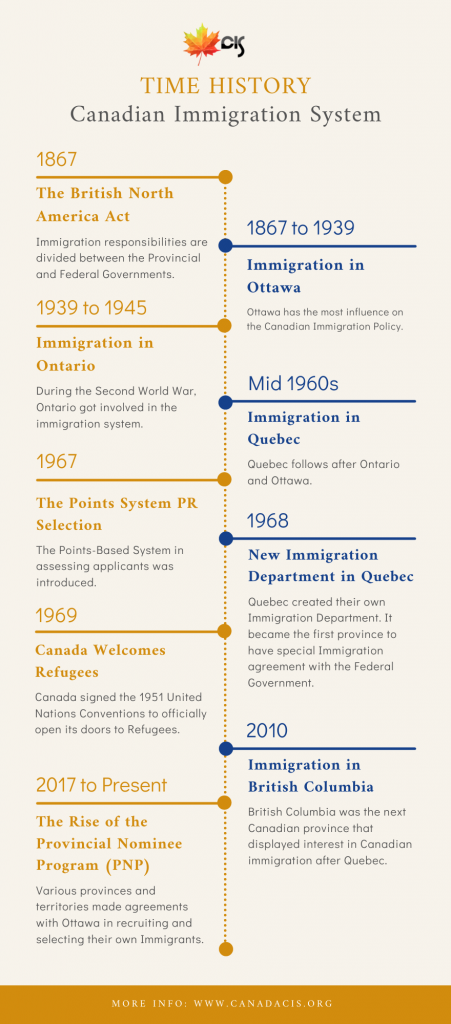A Beginner’s Guide to Canada Immigration System
Home » Blog » Immigration to Canada » The Ultimate Guide to Canada’s Immigration System
Starting a new life in a new country is an exciting and intimidating journey, especially if you are unsure where to begin. This guide will provide you all information about the Canadian Immigration System.
✈️ How does the immigration process in Canada work?
To be a Canadian Permanent Resident (PR) means you have almost the same rights and responsibilities as Canadian Citizens. You are entitled to the social benefits and protection under Canadian Law. You also have the right to live and work or study anywhere in the country. Lastly, you can later apply for Canadian Citizenship.
In this section, we will discuss the six (6) main categories to get your Permanent Resident (PR) Visa in Canada. Each pathway differs in qualifications, timeline, and procedure.
Table of Contents
👩👩👦👦 Family Class Sponsorship
Family Class Sponsorship is one of the popular ways to immigrate to Canada. A Canadian Citizen or Canadian Permanent Resident, ages 18 or above, can sponsor a family or relative to become a Canadian PR. The qualified sponsor is responsible to their relatives financially.
That is until the sponsored relatives can support themselves or within a specified time.
List of family members who are eligible to be sponsored to come to Canada:
◾ Spouse, common-law, or conjugal partner
◾ Children, parents, and grandparents
◾ Brothers or sisters, nephews or nieces, granddaughters or grandsons who are orphaned, ages 18 below, and not married
◾ Another relative of any age and relationship under specific conditions
◾ Accompanying relatives of the above-mentioned
Those interested in applying in this category may go through the eligibility assessment by completing an online form — if you want to get a personal immigration consultant to make the process easier. You have the option to process the application all by yourself through IRCC. The average processing time and approval takes between 12 to 24 months.
👷 Canadian Experience Class
Canadian Experience Class is for those who have experience in Canada or have already settled into the Canadian community. They can either be temporary workers or international students who want to be permanent residents.
To qualify, a Canadian temporary worker must have…
◾ At least two (2) years of skilled or professional work experience within 36 months of PR application
◾ Basic to average English or French language skills
◾ Had legal status while working in Canada
To qualify, an international graduate with Canadian work experience must have:
◾ Completed at least two (2) academic years at a post-secondary institution in Canada
◾ At least one (1) year of skilled or professional work experience within 24 months of PR application
◾ Basic to average English or French language skills
◾ Had legal status while studying and working in Canada
If you are still in Canada and have met the minimum requirements, you can apply from within Canada. Otherwise, you must submit your application within one year upon leaving the country. PR application for the Canadian Experience Class takes place through Express Entry. It can take as early as six (6) months from processing to approval.
👨💼 Federal Skilled Worker
This category is for Canada PR applicants who are likely to contribute to the Canadian economy through their skills and ability as a worker.
To qualify, you must have one (1) year total of experience in at least one (1) of the following jobs groups identified in the National Occupational Classification (NOC):
◾ Managerial Jobs (Skill Type 0)
◾ Professional Jobs (Skill Level A)
◾ Technical Jobs and Skilled Trades (Skill Level B)
Below are the factors affecting your visa approval:
◾ Your educational background (max. 25 points)
◾ Your language ability (max. 24 points)
◾ Your work experience or Canadian employment, if applicable (max. 31 points)
◾ Your ability to adapt to the Canadian economy (max. 10 points)
◾ Your age (max. 10 points)
You can proceed with your application via Express Entry. Without any interruptions, you can expect your visa in 6 months.
👨🏭 Quebec Skilled Worker
Canada PR applicants who want to live in Quebec will be evaluated based on selection criteria set by the province of Quebec instead of CIC.
The ultimate goal is to get a Quebec Selection Certificate. Similar to the Federal Skilled Worker system, Quebec uses a points system in assessing potential immigrants.
Below are the factors affecting your assessment under this pathway:
⚜️ Your education and job-related training (max. 29 points)
⚜️ Your employment offer, if applicable (max. 10 points)
⚜️ Your work experience according to the NOC (max. 9 points)
⚜️ Your age and language proficiency (max. 40 points)
⚜️ Your time spend staying in Quebec with family, if applicable (max. 9 points)
⚜️ Characteristics and qualifications of your spouse (max. 18 points)
⚜️ Number and age of your children (max. 8 points)
⚜️ Your ability to adapt to the Canadian economy + financial capability (max. 9 points)
You must score 60 or above points to qualify as a single PR applicant. If you are married, you must have at least 68 or above points. Note that you must still pass the basic requirements like clearance and medical examinations even if you have a Quebec Selection Certificate. You can get your visa in 6 months via Express Entry.
👩🔧 Provincial Nomination Program
Provincial Nomination Program (PNP) involves an alliance between the Government of Canada and provincial governments. Provincial governments nominate PR applicants who wish to settle in a particular province. You will be assessed based on work demands and your possible contributions to the provincial economy.
Below is the list of provinces currently participating in PNP:
🍁 Alberta Immigrant Nominee Program (AINP)
🍁 British Columbia Provincial Nominee Program (BCPNP)
🍁 Manitoba PNP
🍁 New Brunswick Provincial Nominee Program
🍁 Newfoundland and Labrador Provincial Nomination Program
🍁 Nova Scotia Nominee Program (NSNP)
🍁 Ontario Immigrant Nominee Program (OINP)
🍁 Prince Edward Island Provincial Nominee Program
🍁 Saskatchewan Immigrant Nominee Program (SINP)
🍁 Yukon Provincial Nominee Program (Yukon PNP)
Similar to the Quebec Skilled Worker Program, each territory in the PNP has its selection criteria. Other than the provincial certificates, you will have to submit a medical exam and police check.
You can apply for a visa through a paper-based process which can take 1 to 2 years. But you can consider Express Entry if you want the process done quickly, as early as six (6) months.
💂♂️ Humanitarian, Protected Persons, and Refugees
Canada supports asylum and refugees as part of a humanitarian program. It can be government or privately funded by an individual or a concerning organization in Canada. Applications are assessed on a case basis.
Some factors considered by the Immigration and Refugee Board of Canada (IRB) are:
◾ How settled is the applicant in Canada?
◾ Are there any family ties to Canada?
◾ What are the best interests of any children involved?
◾ What could happen to the person if his request is denied?
It can take 18 to 24 months to process this type of application. While waiting for approval, the applicant may stay in Canada and may be able to receive social benefits like health care, work, and housing assistance from the government. If the person receives an application refusal, he will be deported back to his country of residence.
🛫 Who immigrates to Canada, and where do they come from?
Canada is a place of diversity, thanks to its open immigration policy! Individuals of different classes and ethnicities reside in the Land of the Maple Leaf.
There are four (4) immigrant classifications in Canada. These are Family Class, Economic Immigrants, Humanitarian and Compassionate Applicants, and Refugee Class. Let us have a closer look!
This class includes sponsored immediate or extended family members. Canada PR applicants who went under the Family Class Sponsorship pathway belong to this immigrant classification.
These are immigrants who contribute to the Canadian economy through their skills, knowledge, and business capabilities. Canada PR holders who went under PNP, Quebec Skilled Worker Program, Federal Skilled Worker Program, and Canadian Experience Class Program belong to this group.
These are applicants who are yet to have refugee status, but have earned the right to stay in Canada while waiting for approval. Individuals under this class have fled their country of origin to seek protection in Canada. They may have come from either a place of conflict or persecution.
These are asylum seekers or humanitarian and compassionate applicants who have been approved and granted rights. It means they are no longer applicants, but are now considered people with refugee status.
🕰️ Time History of Canada Immigration Policy
Have you ever wondered when and how Canada Immigration started? Who was responsible for the early immigration policy? Below is a short infographic on how the Canadian Immigration Policy developed over time.
🍁 How does the Canadian Immigration system work now? Immigration updates
Because of the pandemic, the Government of Canada implemented temporary changes, restrictions, and support to various immigration programs.
HSBC Bank Canada launches the Canada Newcomers Program. The qualified applicants will receive $1,000 worth of financial support with a $500 welcome bonus.
Immigrants who took Canada-accepted vaccines are exempted from quarantine and COVID19 tests upon arrival. You still need to take a pre-arrival coronavirus test. Below is the list of accepted vaccines:
💉 Pfizer-BioNTech (Comirnaty, tozinameran, BNT162b2)
💉 Moderna (mRNA-1273)
💉 AstraZeneca/COVISHIELD (ChAdOx1-S, Vaxzevria, AZD1222)
💉 Janssen/Johnson & Johnson (Ad26.COV2.S)
If you have not taken a vaccine, you must take pre-entry and post-arrival COVID19 tests + quarantine for a minimum of 14 days. Failure to comply with protocols might result in paying fines and penalties to imprisonment.
Some provinces in Canada have additional restrictions from what is already in place by the federal government. Make sure to check them out on official provincial government websites.
🍁 British Columbia
🍁 Manitoba
🍁 New Brunswick
🍁 Newfoundland and Labrador
🍁 Northwest Territories
🍁 Nova Scotia
🍁 Nunavut
🍁 Ontario
🍁 Prince Edward Island
🍁 Quebec
🍁 Yukon
Canada is continuously accepting applicants with priority given to PR applicants who belong to vulnerable groups and workers under the essential services industry.
Processing time has become stricter. The Government of Canada no longer gives automatic deadline extensions in submitting supporting documents. You have 30 days to submit all documents upon receipt of the request. It is advisable to prepare all files before the immigration department contacts you. Note that the people affected by the coronavirus may qualify for extensions.
Registered Canadian Consultants and How They Can Help You Move to Canada
Registered Canadian immigration consultants play a significant role in assisting individuals who want to move to Canada. Here’s how they can help:
Assessment of Eligibility: Consultants can assess your eligibility for various immigration programs based on factors such as education, work experience, language proficiency, and other relevant criteria.
Choosing the Right Immigration Program: Canada has several immigration pathways, including Express Entry, Provincial Nominee Programs (PNPs), family sponsorship, and more. Consultants can guide you in choosing the most suitable program based on your qualifications and goals.
Documentation Assistance: Consultants help gather and organize the necessary documentation for your application.
This includes educational certificates, work experience letters, language proficiency test results, and other supporting documents.
- Application Preparation: They assist in preparing your application forms, ensuring that all information is accurate and complete. This is crucial to avoid delays or rejection due to errors.







